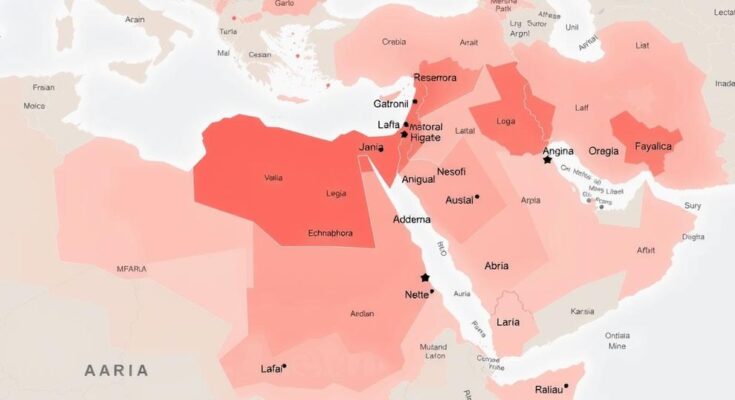Qatar and Jordan have condemned an Israeli map claiming historical territories that encompasses parts of their nations. The map, viewed as a violation of international law, has raised concerns about regional peace, particularly regarding Palestinian sovereignty and rights. Both countries stress the need for international accountability regarding Israel’s territorial claims.
A recent map published by the Israeli government, which asserts historical territorial claims, has provoked strong denunciations from both Qatar and Jordan. This controversial map, distributed via the Israeli Foreign Ministry’s Arabic social media account, illustrates what it states are the biblical boundaries of ancient Israel, extending into areas currently recognized as parts of Jordan, Lebanon, and Syria. The depiction prompted both countries to express serious concerns about its implications for regional stability and the ongoing Israeli-Palestinian conflict.
The Qatari Foreign Ministry issued a robust condemnation of the map, describing it as a blatant violation of international law and a threat to peace in the region, especially amidst the ongoing conflict in Gaza. Qatar urged the international community to hold Israel accountable for its expansionist policies and to champion the rights of the Palestinian people. Similarly, Jordan’s Ministry of Foreign Affairs characterized the publication as a denial of Palestinian sovereignty, reaffirming Jordan’s position that Palestinians deserve an independent state based on borders prior to the 1967 conflict.
Historically, geopolitical tensions in the region have been exacerbated by territorial claims and military occupations. Israel has faced criticism for its longstanding presence in Palestinian territories and for undermining international resolutions aimed at establishing a peaceful coexistence. The claims made in the recent map are perceived as part of a broader Israeli strategy that has included provocative motions from government officials, undermining the prospects of a two-state solution.
Qatar’s Ministry of Foreign Affairs remarked, “the publication of these maps a flagrant violation of international legitimacy resolutions and the provisions of international law.” Jordan’s spokesperson, Ambassador Dr. Sufian Qudah, affirmed that these aggressive aspirations do not diminish Jordan’s status nor the legitimate rights of the Palestinian people.
In summary, the release of the Israeli map claiming historical territory continues to exacerbate existing tensions in the Middle East, with significant backlash from regional players like Qatar and Jordan. Both nations emphasize the need for international intervention to safeguard Palestinian rights and maintain peace amid persistent conflict. Ultimately, the future of regional dynamics hinges on addressing these contentious territorial claims and fostering a path towards diplomatic resolution.
The release of a map by the Israeli government has significantly heightened tensions between Israel and its Arab neighbors, particularly Qatar and Jordan. The map asserts that historical Israeli territorial claims extend into parts of Jordan, Lebanon, and Syria, prompting swift and vehement reactions from both nations. Throughout history, territorial disputes in the region have fueled political and military conflicts, and such publications are perceived as gestures that challenge established international norms and resolutions concerning the Palestinian territories.
The recent condemnation from Qatar and Jordan highlights the fragility of relations in the Middle East, exacerbated by claims to historical territory by Israel. Both nations firmly oppose such measures, viewing them as threats to regional peace and stability, especially concerning Palestinian sovereignty. Moving forward, constructive dialogue and adherence to international norms will be essential to alleviating tensions and advancing the prospects for peace.
Original Source: www.palestinechronicle.com



